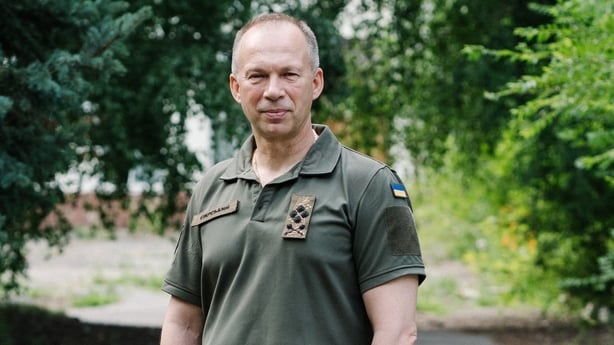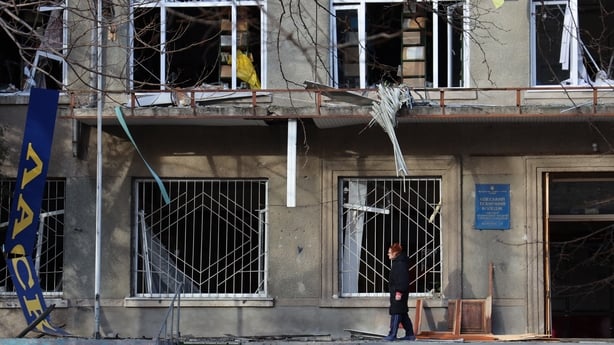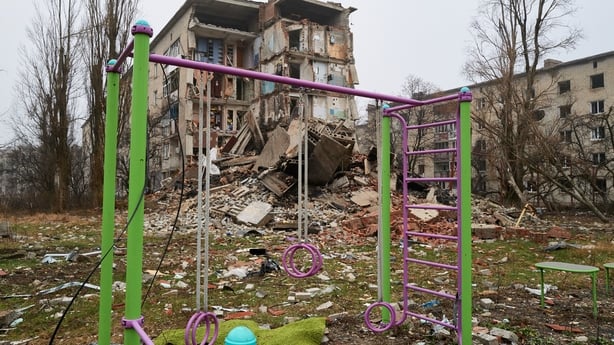Ukraine's top commander Valery Zaluzhny was removed from his post on Thursday, in the biggest shake-up of Kyiv's military leadership since Russia's invasion began almost two years ago.
The popular general had led the Ukrainian army since the start of the war, pushing back a vastly more powerful invading force in the first months of the conflict.
But the failure of a much-vaunted counteroffensive last summer and public disagreement with Ukrainian leader Volodymyr Zelensky tarnished his reputation in the president's office.
"Today we had a frank discussion about what needs to change in the army. Urgent changes," President Zelensky said in a statement on social media.
"I have offered General Zaluzhny to continue to be part of the team of the Ukrainian state," Mr Zelensky wrote, adding: "I would be grateful for his consent."
Oleksandr Syrsky, who commanded Ukraine's lightning autumn 2022 counter-offensive in the northeastern Kharkiv region, will take Zaluzhny's place, Mr Zelensky announced.
'Urgent' shakeup
The announcement - first made by the recently appointed defence minister - ended days of speculation over Zaluzhny's future.
After over a year of deadlocked trench warfare, with Russia's army relentlessly pressing against outmanned Ukrainian soldiers across the sprawling front, Kyiv has sought urgent changes.
New army chief Syrsky faces a myriad of challenges in his tray.
Large numbers of Russian forces are currently storming the frontline Ukrainian town of Avdiivka, while Moscow has intensified artillery strikes in the northeast Kharkiv region in a bid to force a Ukrainian withdrawal.
Announcing Zaluzhny's sacking, President Zelensky called on his new military leadership to devise a strategy to beat back Russian forces.
"The year 2024 can be successful for Ukraine only if we make effective changes in the basis of our defence, which is the Armed Forces of Ukraine," he said.
I met with General Valerii Zaluzhnyi.
— Volodymyr Zelenskyy / Володимир Зеленський (@ZelenskyyUa) February 8, 2024
I thanked him for the two years of defending Ukraine.
We discussed the renewal that the Armed Forces of Ukraine require.
We also discussed who could be part of the renewed leadership of the Armed Forces of Ukraine.
The time for such a renewal… pic.twitter.com/tMnUEZ3BCX
The Iron General
Dubbed the "Iron General" by Ukrainian media, Zaluzhny came to symbolise the country's resistance against Russia and enjoyed sky high approval ratings among the public.
He also garnered enormous respect among his troops, many of whom considered him a father figure.
While he had avoided the political spotlight, he is credited with spearheading some of Ukraine's most successful military campaigns, including the liberation of Kherson city in November 2022.
But his public comments - to Western news outlets no less - proved a source of constant consternation for President Zelensky, already struggling to maintain unity over the issue of mobilisation.
In November 2023, Zaluzhny told The Economist that the conflict with Russia was at a "stalemate" and there would "most likely be no deep and beautiful breakthrough", an admission that Mr Zelensky flatly denied.
Then, in an opinion piece for CNN exactly three months later, the 50-year-old said the army was bogged down by "regulatory framework" and called for urgent modernisation.
Zaluzhny said Ukraine would not be able to boost its army's manpower unless lawmakers took "unpopular" measures to mobilise more men.
But calls to mobilise half a million more people to swap out long-serving exhausted soldiers proved a highly divisive issue in a nation drained by fighting.

The new army chief had previously commanded Ukrainian troops fighting a Moscow-backed insurgency in the eastern Donetsk and Luhansk regions that began in 2014, and was given the call sign "snow leopard".
Some of Ukraine's biggest victories of Russia's full-scale invasion were overseen by Mr Syrskyi.
He led the successful defence of the capital Kyiv in the early months and was named a Hero of Ukraine, the country's highest honour, in April 2022.
In July of that year, Mr Syrskyi planned and executed a lightning counteroffensive that pushed Russian troops away from the city of Kharkiv and retook swathes of land to the east and southeast.
Early last year, Mr Syrskyi led Ukraine's defence of the eastern city of Bakhmut, where thousands of soldiers on both sides were killed in one of the bloodiest battles of the war so far.
Mr Syrskyi said Ukraine's dogged defence of Bakhmut had damaged Russia's overall war effort by tying down the Wagner mercenary group.
Meanwhile Russia said it had secured the release of dozens of its prisoners of war in the latest swap since Moscow accused Kyiv of downing a plane carrying captured Ukrainian soldiers.
"On 8 February, as a result of negotiations, 100 Russian servicemen who were in mortal danger in captivity were returned from territory controlled by the Kyiv regime," Russia's defence ministry said in a statement, which added that Moscow had handed over 100 Ukrainian servicemen in return.
Confirming the move, President Zelensky said that the majority of the people released were "Mariupol defenders".
"National Guard, Border Guards, and Armed Forces.. These are all our people, and they have returned to their homeland. We are working on bringing back every Ukrainian who is still in captivity, and we will not stop until we do. I am grateful to our team involved in the prisoner exchanges for the result the country needs," he said on X, formerly Twitter.
The Kremlin says latest ICC allegations are 'outrageous'
Russia must end the forcible transfer of children from Ukraine and provide information about those already taken and ensure they are returned home, the United Nations Committee on the Rights of the Child has said.
Kyiv says 20,000 children have been taken from Ukraine to Russia without family or guardians' consent, and the International Criminal Court (ICC) is seeking the arrest of Russian President Vladimir Putin for alleged illegal deportation, an accusation the Kremlin denies.
The UN Committee, a panel of 18 independent experts, pressed Russia on the deportation allegations during a regular review of its record last month.
In its report, the Committee said Moscow should provide information about the precise number of children taken from Ukraine and their whereabouts, so they can be identified and returned.
The committee also said Russia should ensure that no child was deprived of their Ukrainian nationality, and that their identity, name and family relations must be preserved.
Moscow says it has only been protecting vulnerable children from a war zone.
Russia has said that "placements for evacuated children are arranged, first and foremost, at their request and with their consent".
Committee chair Ann Skelton said the committee and a Russian delegation that travelled to Geneva last month for talks on child issues had been "talking past one another".
"We found often in the dialogue that we were using one type of terminology and they were using another.
"We were using the word 'adoption' and they were denying that it's adoption and talking about 'fostering children'."
She said the delegation had acknowledged that many children had been given Russian citizenship, "which would also in itself mean that these children were losing their identity and being given a Russian identity".

Committee vice chair Bragi Gudbrandsson told reporters the experts had concluded there was "evidence of forced transfer of children from Ukraine to Russia".
"We cannot identify the number of these children but we know that they are many," he said.
The ICC issued arrest warrants last March for Mr Putin and Maria Lvova-Belova, Russia's commissioner for children's rights, on charges of illegally deporting children from Ukraine.
The ICC's chief prosecutor said Russia had transferred "at least hundreds" of children from orphanages and care homes in occupied regions of Ukraine, and that many had been given up for adoption.
Russia is not a member of the ICC and insists the warrant against Mr Putin is "void".
Read the latest stories on Russia's invasion of Ukraine
More broadly, the experts expressed concern at the impact Russia's war in Ukraine is having on children, pointing to the "killings and injuries of hundreds of children as a result of indiscriminate attacks... with explosive weapons".
They called in particular on Moscow to ensure that hospitals and schools are not targeted.
They also voiced concern over the situation for children inside Russia, including reports that children, as adults, are being persecuted for expressing political opinion, and especially for criticism of the Ukraine war.
They also highlighted "widespread and systematic state propaganda in schools about the war on Ukraine", calling on Moscow to "put an end to the politicisation and militarisation of schools".
"We consider it to be a very big risk for the future of these children, who are being indoctrinated," Ms Skelton told reporters.
Avdiivka being attacked from 'all directions'
Large numbers of Russian troops are attacking Avdiivka in east Ukraine from all directions, and the situation is increasingly difficult for Ukrainian troops defending the town, its mayor has said.
Russian forces have taken the initiative on the eastern front in the industrial Donbas region of Ukraine and have been trying to cut supply lines and encircle Ukrainian forces dug in at Avdiivka since October.
"The enemy is pressuring from all directions. They are storming with very numerous forces," Avdiivka mayor Vitaliy Barabash said in televised comments, describing the situation as "very difficult and hot".
Pounded by fighting in the region since 2014 that surged in February 2022, Avdiivka has sustained heavy damage.
There are now only 941 residents in the town that was once home to 32,000 people and has a large coking plant, Mr Barabash said.
Avdiivka's fall would be hailed by Russian authorities as a hard-fought victory before an election next month in which Mr Putin widely expected to be re-elected.

In its daily readout of the situation in Avdiivka, the Ukrainian military said Kyiv's troops were holding back Russian forces.
"Our soldiers firmly hold the defence, inflicting significant losses on the invaders," it said.
Ukraine's ground forces said the situation was tense across the east of the country.
"The enemy is trying to break through our defence in the area of Chasiv Yar (in the Donetsk region) and resorting to local actions by small storm groups under the cover of drones and artillery," they said on the Telegram messaging app.
Avdiivka is located in Ukraine's eastern Donetsk region, which the Kremlin claims is part of Russia, along with four other Ukrainian territories that Moscow says it has annexed.
President Vladimir Putin last month was the first Russian official to claim that his forces had gained a foothold in the city.
Further east in Donetsk region, emergency services said that one person had been killed and seven more injured during Russian shelling of the village of Selidove.
The last major victory on the front came from Russian forces last May with the capture of Bakhmut after months of costly fighting on both sides.
Ukraine's army commander in charge of the region, Oleksandr Syrsky, visited Ukrainian troops holding back Russian forces on Bakhmut's outskirts and warned of mounting Russian attacks.
"The situation is tense, requiring constant monitoring of the situation and prompt decision-making directly on the ground," he was cited as saying by the military on social media.
He said Russian forces were using kamikaze drones and electronic warfare alongside assault groups with artillery cover to break through Ukrainian defence lines outside Bakhmut.
Kyiv also said that Russia had launched another barrage of Iranian-designed attack drones at Ukraine overnight, and that its air defence systems had downed 11 of 17 drones.
Officials in the Black Sea region of Odesa said the attack had damaged a school and left two police officers injured, while in the Vinnytsia region, authorities said debris from downed drones had led to a fire at an infrastructure facility.

